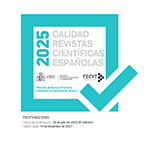Banning fake news in health emergencies. Predictors of opinion on the control of information in Spain
Abstract
The aim of this paper is to analyze the sociodemographic, ideological and partisan factors that predict citizens' opinion on government control of information in the context of a health emergency in Spain. Data from the April 2020 CIS survey were used. This poll included a controversial question on the banning of fake news during the pandemic. Correlational studies, factorial analysis, linear and logistic regression studies were performed. Although ideological biases are a strong predictor of opinion on information control, partisan affiliation and certain sociodemographic factors such as educational level and age have greater influence on opinion about the prohibition. Voting for the parties that constitute the government increases the probability of supporting the restriction by 40%. Having a higher education practically doubles the probability of expressing an attitude against the suppression of fake news.
Downloads
Article download
License
In order to support the global exchange of knowledge, the journal Estudios sobre el Mensaje Periodístico is allowing unrestricted access to its content as from its publication in this electronic edition, and as such it is an open-access journal. The originals published in this journal are the property of the Complutense University of Madrid and any reproduction thereof in full or in part must cite the source. All content is distributed under a Creative Commons Attribution 4.0 use and distribution licence (CC BY 4.0). This circumstance must be expressly stated in these terms where necessary. You can view the summary and the complete legal text of the licence.










